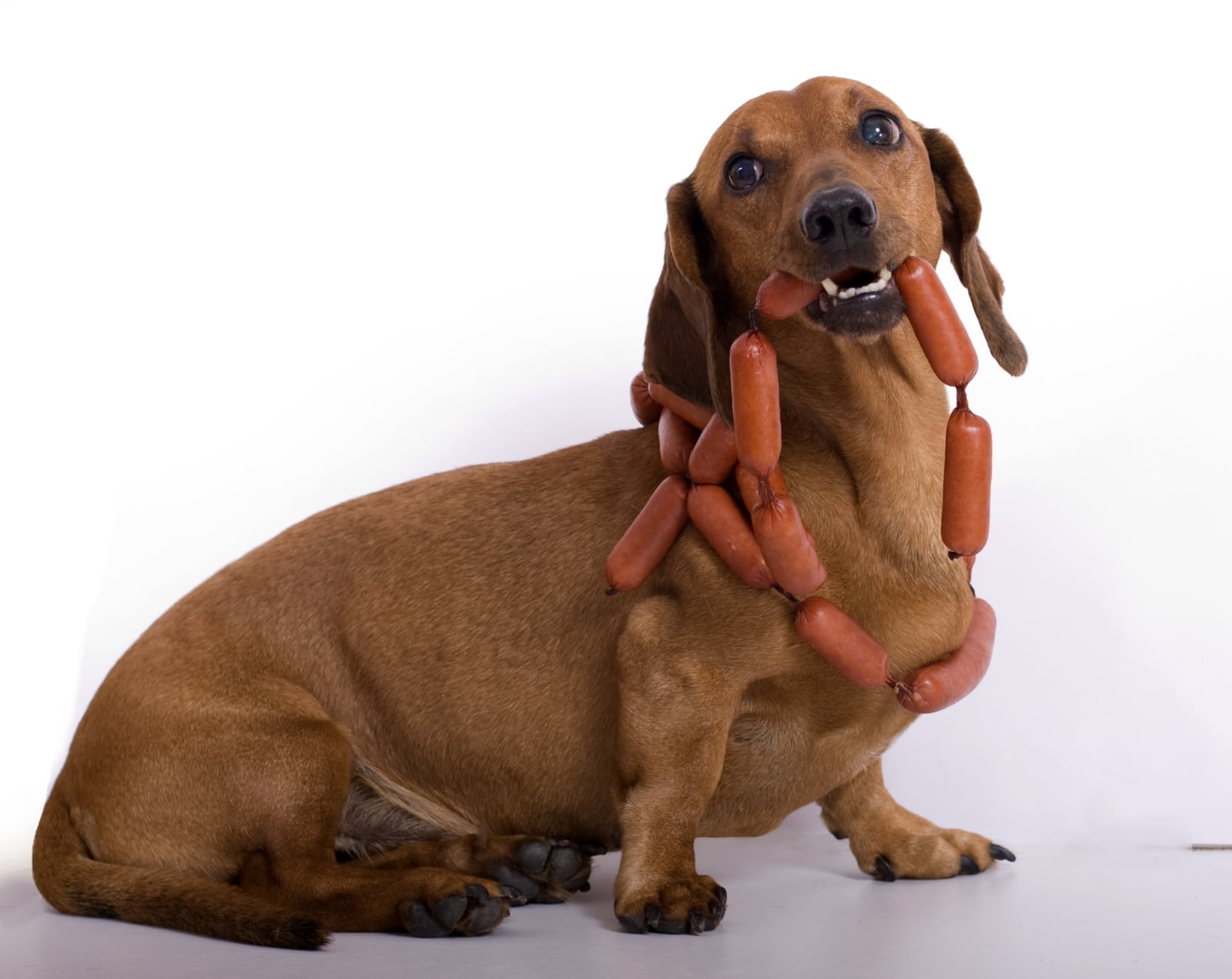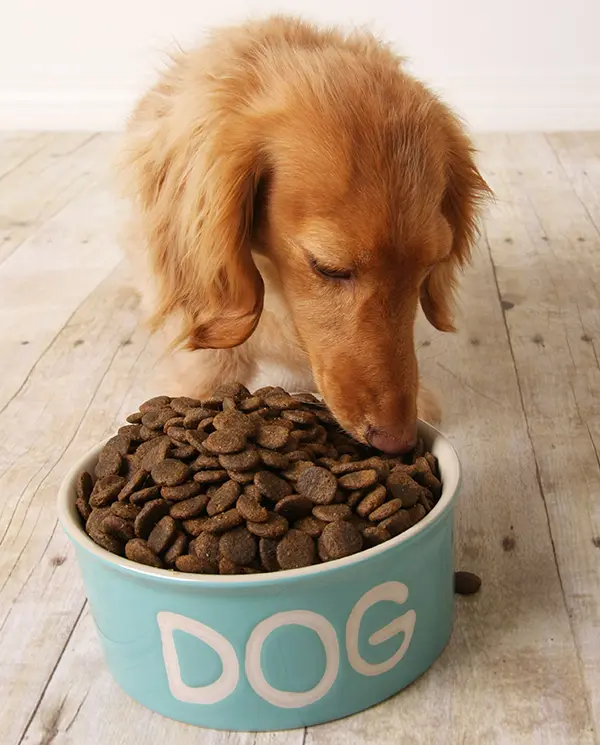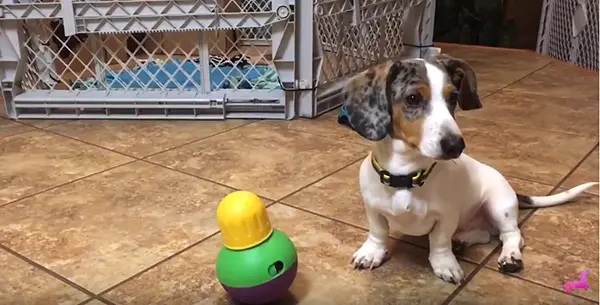
5 Simple Weight Loss Tips for Dachshunds
Ever find yourself tempted to share a little nibble here, a lick of a leftover plate there with your sweet, puppy-eyed Dachshund? That ‘I’m starving’ look they give can tug at the heartstrings, but as much as it feels like showing them love, it’s actually quite the opposite.
Those occasional ‘small’ shares can quickly add up, leading to extra pounds your doxie really shouldn’t carry and putting their health at risk!
Keep reading to discover 5 Simple Weight Loss Tips for Dachshunds.
This page contains affiliate links and I earn a commission if you make a purchase through one of the links, at no cost to you. As an Amazon Associate, I earn from qualifying purchases.
Table Of Contents
How Much Should a Dachshund Weigh?
This chart provides estimated healthy weights tailored to each type of Dachshund – standard, mini, tweenie, and toy.
Use this chart as a baseline to help ensure your doxie maintains a healthy weight suitable for their size. Making sure your pup stays within these ranges can promote their overall health and longevity.
Is My Dachshund Overweight?
You can generally tell if your Dachshund is overweight by just looking at them. If the shape of their body is more of a barrel instead of an ‘hourglass‘, they may be overweight.
This is something my vet taught me. It’s a quick way of telling if your doxie is starting to put on the pounds. Check the following…
1. View from Above: Look for a visible waist. The rib cage and pelvic area should be wider than the belly area.
2. View from the Side: When looking at your doxie from the side, see if their belly has an upward curve (see pic below).
A healthy weight will show a slight tuck, with the abdomen higher than the chest. If your dog’s stomach hangs down or forms a straight line with their back legs, they could be overweight.
3. Feel the Ribs: Run your hands along your Dachshund’s rib cage. You should be able to feel, but not see, their ribs beneath a thin layer of fat and skin. If you have to press firmly to feel their ribs, they may be overweight.
4. Check with your Vet: When my Dachshunds, Eko and Bastian, visit the vet, she always lets me know if they are starting to put on extra weight.

Why is it so Risky for Dachshunds to Put on the Pounds?
An Overweight Dachshund!
My childhood Dachshund, Heidi, (pictured below) was a ‘labeled’ as a Miniature Dachshund.
From what I can remember, she shared a cup of coffee with my dad every morning. She also enjoyed her own piece of Birthday Cake at everyone’s birthday party and helped lick everyone’s dishes clean after mealtime.
Heidi was given a lot of table scraps for many years and she was dangerously overweight.

5 Weight Loss Tips for Dachshunds
As a loving doxie parent, it’s crucial to learn about portion control and how to put healthy habits into place – it really can make a world of difference to your little long dog’s health. Here’s how!
1. Quality Dog Food
Check the Ingredients: It is important to feed your Dachshund a vet recommended healthy diet. Always read the list of ingredients on the back of your dog’s food.
The Meat of choice (fish, chicken, beef, etc..) should be listed within the first couple of ingredients.
DIY Dog Food: If your doxie has food allergies, try a homemade dog food recipe. More on that below.

What Should I Feed My Dachshund?
My veterinarian recommends Science Diet or Royal Canin dog food for Dachshunds.
My Dachshund, Eko, is built like a tank (piebald doxie pictured below). He is registered as a mini-Dachshund but has the build and weight of a tweenie (in between a mini and a standard).
When Eko starts to put on some extra pounds, especially in the cold winter months, I switch him over to Science Diet Perfect Weight. This dog food helps him maintain a healthy weight, along with our daily walks.
Real chicken is listed as the first ingredient, and it also includes salmon oil. Great for healthy joint and bone support.

Homemade Dog Food
Some Dachshund owners prefer to make their dog’s food at home – especially if they suffer from itchy food allergies. By using your own natural ingredients, you know exactly what your dog is consuming.
Talk to your vet for recommendations on a well-balanced meal plan and amount per serving for your dog if you are interested in creating your dog’s food at home.
Related Post: Homemade Dog Food Your Dachshund Will Love!
Improve their Gut Health
Gut health matters for you and your little long dog too!
If your Dachshund tends to have a sensitive stomach with their dog food or doggie treats, try adding in some dog probiotics.
My Dachshund, Reno, had a very sensitive stomach. His tummy couldn’t tolerate different foods and dog treats without getting sick.
I took him to Petco for his Birthday to pick out a toy and the lady at the checkout gave him a special doggie cookie for free. I thought it was so nice, but poor Reno was sick for the rest of the evening.
My vet recommended that I add some probiotics to his diet to help him with his digestive issues and they really did help.
Post You May Like: 6 Signs Your Dachshund Needs Probiotics

2. Feeding Schedules by Age
Dachshunds have a large appetite compared to other dog breeds. It is important to have a strict feeding schedule for your Doxie instead of allowing them to ‘graze’ all day long.
Maintain a healthy feeding schedule to reduce obesity and prevent IVDD in your Dachshund.
Dachshund Puppy Feeding Schedule:
For Dachshunds under the age of one, look for a dry dog food formulated just for puppies. High quality puppy food usually includes more protein and fatty acids to help build strong muscles and maintain healthy energy levels.
Puppies under 6 months of age should have 3 small meals per day.
Once in the morning, one time in the afternoon, and in the evening for dinner. Pretty much, the same time that you eat your meals.
Set the puppy’s dog food bowl down for 20 minutes at a time. Then, take the bowl up until the next feeding.
Check the dog food bag to make sure you are giving them the correct amount.
Training Tip: Your puppy should eat their evening meal before 6 pm. This will help reduce the number of overnight accidents.
Adult Dachshund Feeding Schedule:
*Diet by Age: At 12-14 months of age, your Dachshund is considered an adult and their dog food changes. Some dog food brands split their foods up by age – which really helps tailor the ingredients to their health needs.
A Dog food that is high in fat or has too many calories will lead to weight gain and lower energy levels.
Note: If you stick with Science Diet dog food, they have the age printed on the cover. My Dachshund, Eko is 4 years old, so he eats the Adult 1-6 dog food.
*Feed two times per day: Your adult Dachshund should eat two times per day now. Once in the morning and once at night is ideal.
Spreading out the meals allows the dog to digest smaller amounts and reduce any digestive issues.
*No Grazing! Don’t leave your dog’s food bowl on the ground all day. Allowing them to graze on their food will promote weight gain.
*Slow Feeder Bowls: Dachshunds tend to gulp and choke on their food, especially if they love the flavor. This unfortunately can lead to vomiting, digestive issues, and a dangerous condition called Bloat. Feeding your dog their meal in a slow feeder dog bowl promotes a healthy weight and drastically improves their digestion!

Adult Dachshunds require less fat, protein, and calories in their diet than they did as puppies.
Senior Dog Feeding Schedule:
Dachshunds are considered senior dogs around age 8. Senior dogs can continue the adult feeding schedule, 2 times per day, as long as they are in good health.
*They Eat Less: Senior dogs will do a lot more napping around the house, so they may eat smaller amounts of food than they used to.
*Switch to Senior Dog Food: There are senior dog food options that can help with digestion and joint health as they grow older.
Most senior dog foods include more fiber, which promotes healthier digestion.

Portion Control
How Much Should I Feed My Dachshund?
On the back or side panel of your dog food bag, there is a chart that will help you determine how much food your dog should be eating.
It usually goes by your dog’s weight or age. If you need some extra help with portion control, consult your vet.
Always Measure Out Your Dog’s Food: Using a dog food measuring scoop is a must when trying to get your Dachshund’s weight under control. It ensures you are feeding your doxie the right amount and not just guessing.

3. Healthy Habits
*No Table Scraps! I know, this is a tough one. Leftovers from the table are not good for your Dachshund’s health and can actually make them finicky eaters – they won’t want to eat their dog food anymore.
It becomes a dangerous routine, every meal, every day. Unfortunately, Dachshunds are one of many small breeds that are more Prone to Obesity.
Training Tip: Dachshunds don’t naturally crave people food. They develop the taste once they are exposed to the food. Table Scraps are like fast food for dogs (fatty and addicting).
*Clean Drinking Water: Always keep your long dog well hydrated. Make sure to give them clean drinking water daily. Filtered water bowls are even better at keeping your dog’s water clean. Make sure to wash your dog’s water dish a couple times per week.

4. Mind and Body Exercises
A consistent exercise routine for your Dachshund is very important to your pup’s physical and mental health.
Dachshunds love to eat and nap, so it is super easy for them to become overweight when not properly walked or played with.
How Do You Exercise a Dachshund?
*Exercise their Body: Plan to walk 15-20 minutes, 2-3 times per day. Keep it at their pace, remember, they have shorter legs and need to put in more of an effort to keep up with you – especially if they are overweight.
Don’t plan on a sweaty ‘workout’ kind of walk. A dachshund walk will be more of a walk, stop, and sniff stroll. Your dachshund will love it and look forward to it daily.
Tip: Wait at least 45 minutes to an hour after your dog finishes their meal for any vigorous exercise to prevent bloating.
*Exercise their Mind: Challenging your Dachshund’s brain with fun puzzles (aka Mental Stimulation) is just as important as physical exercise when it comes to the Dachshund dog breed.
Dachshunds need to stay busy to stay out of trouble!
Doggie IQ Games: Searching for hidden treats or solving dog puzzles will give your doxie so much joy and reduce any destructive behavior in the process. Dog IQ puzzles help reduce boredom and separation anxiety issues.
Here’s a cute video of my Dachshund, Eko, playing with his favorite Bob-A-Lot Toy (on YouTube).

5. Underlying Illness
Why is My Dachshund Gaining Weight? Your dog may have an underlying illness that is causing the weight gain. Chronic illnesses like Cushing’s Disease and Hypothyroidism can cause weight gain in dogs.
What Helps Your Dachshund Lose Weight? Let us know in the Comments.
Helpful Links:
Reduce Dachshund Obesity, Fat Dachshunds, Dachshund Weight Loss plan.




My little guy, Cooper is a 5-year-old Tweenie. He has had a lot of health issues, including a slipped disc in in his lower back. It was awful watching him be paralyzed and in pain. The good news is, he partially recovered and can walk again, although he waddles and his back “goes out” occasionally. So, Cooper has always been on the plump side, but he is now downright obese. I am going to stop feeding him red meat (steak) plus his Purina Pro Plan and try to find a weight control dry food that does not have chicken. He is allergic to chicken. It gives him the runs and terrible gas.
Thank you for your tips as I want him to be as healthy as possible.
Hi there, I’m so sorry to hear about Cooper’s health struggles. Spinal issues make it so hard to get the exercise they need. It’s great to hear that he’s walking again. It sounds like you have a good diet plan to try going forward. Best of luck with Cooper. Keep up the good work. :)
I decided after read a Royal Canin Satirty dog fodd that gave Willow gastritis. The ingredients shocked me. Celluse and chicken by products. I researched what was and was amazed that my vet would recommend this to me. So that’s why I decided to try out your recipe. I haven’t made it yet. It’s important that Willow lose weight. She weighs 14 lbs and must get down to 12. My question is where does fruit come in and what kind.
Hello Joy, I feed my doxies science diet dog food. A couple of times per year, I switch it up with my homemade dog food recipe for dachshunds, which they really love. Sorry about the Royal Canin, my vet also recommended that to me. We just have had good luck with science diet dog food (not the ‘science diet prescription dog food’ from the vet, but the pet store dog food). As for the fruit, that can be used as an occasional healthy treat. Fruit is healthy, but has a lot of natural sugars, so keep it a ‘once in a while’ treat. Here are some DIY Easy Homemade Dog Treat Recipes for you.
Thank you for your advice on how to help my dachshund to lose some weight. I‘m already following some of yours 5 tips, but I would like some recomendación preparing home healthy meal plan for cookie. She is the light in my house I want her to be with us the longest possible. Thank you in advance
Hello Ana, Thanks so much. I am glad that you are finding these weight loss tips for dachshunds helpful. I use hills science diet for my dachshunds. This dog food is tailored to their age and weight needs. They have a science diet dog food that is special for weight loss as well.
As for home cooked meals. Check with Cookie’s vet for the right amount of certain ingredients to make sure she is getting everything she needs. My dogs LOVE the bland diet (boiled chicken and white rice), but that meal doesn’t give enough vitamins and minerals that they need everyday.
I would recommend checking out some of these dog food recipes you can make at home (this one’s from Shelby Marie Makes):
https://www.youtube.com/watch?v=XTdvd80zyvA
Here are some homemade doggie treats as well:
https://www.dachshundstation.com/homemade-dog-treats/